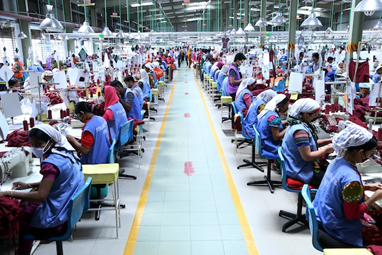DHAKA, April 22, 2018 (BSS) – Bangladesh apparel industry is in the leading position globally in building safe work environment, said Bangladesh Garment Manufacturers and Exporters Association (BGMEA).
Terming Rana Plaza tragedy ‘a wake-up call’ for Bangladesh readymade garment (RMG) industry, BGMEA President Siddiqur Rahman said: “We, the entrepreneurs, have concentrated on ensuring risk-free work environment for our labourers along with building sustainable industry.”
“Now, we are the role model globally in building safe work environment,” said Siddiqur in an interview with BSS on the eve of the 5th anniversary of the Rana Plaza tragedy that took place on April 24, 2013 leaving 1,138 people dead and nearly 2,000 others injured.
After the shocking incident, the government, global brands and BGMEA took different initiative to overcome the disastrous situation.
The BGMEA President said initiatives were taken to inspect and carry outremediation work in the factories under international bodies Accord and Alliance and National Action Plan (NAP) of the government.
“And till today, Accord has declared 88 percent of their remediation work completed while Alliance 90 percent,” he added.
Accord, a platform of EU-based western buyers and trade unions, and Alliance, another platform of North American apparel brands, retailers and companies, have inspected and monitored remediation work of 2200 factories while NAP have done the job in 1500 factories.
“Of the 2,200 factories, 39 factories were found vulnerable and the government immediately shut down those,” said Siddiqur.
Besides, under the NAP, 900 factories, out of 1,500, have been shut down and remediation work of remaining 600 factories has been going on. Of those, some factories completed 70 percent remediation work while some others 50 percent and the remaining ones 30 percent.
“But by the 30th April, they (factories) have to complete the remediation work, otherwise they will be shut down,” added the BGMEA President.
Replying to a query whether the BGMEA is satisfied with the progress, he said: “We can now say our RMG sector is 100 percent transparent and safe.”
The BGMEA chief said the Accord and the Alliance were formed for five years and they will complete their tenure at the end of the next month. “We are thinking to make our industry sustainable that is why we are going to form “Transitional Accord” for six months and the government has agreed with us.”
Siddiqur said the Transitional Accord will monitor the work of Remediation Coordination Cell (RCC), which was established at the initiative of ILO and the government, whenever it is. “So, the transitional accord will hand over the monitoring job to RCC when it is ready.”
“On the other hand, we are going to take another initiative to form Safety Monitoring Organization (SMO) for Alliance and it will monitor the sustainability of the apparel industry,” said the BGMEA President, adding, “When the RCC feels they are ready, the SMO will hand over the job to it.”
The RCC has appointed over 300 inspectors to inspect factories, he reveled.
About the rehabilitation of injured labourers of Rana Plaza, he said the families of dead labourers have been given payments as per the international calculation from the Rana Plaza Trust Fund while the injured labourers are still getting treatment facilities.
Regarding the members of BGMEA, the president said although over 3,000 factories have been running operation, BGMEA has around 4,000 members at present. “Cancelation of membership of some factories is under process now.” “It’s true that some factories have been shut down, but at the same time a number of new factories have joined the business,” he added.
Expressing gratitude to the government, the BGMEA president said “The government has done enough and we do not want any more from the government.”
Regarding the survey report of a university of New York, he said “I totally disagree with this survey.”
“We are getting high appreciation from the external world,” said Siddiqur referring to his recent participation in a seminar in the Netherlands where Bangladesh was praised highly for overcoming the shocking incident of Rana Plaza collapse.
The report was prepared after talking to only 200 labourers of the sector over telephone and it did not reflect the actual picture of Bangladesh’s apparel industry, he added.
Mentioning that any type of accident and loss of lives are not acceptable, he said: “Accident does not only happen in Bangladesh rather it occurs in different countries in the world, but criticism runs high marking the anniversary of Rana Plaza tragedy.”



